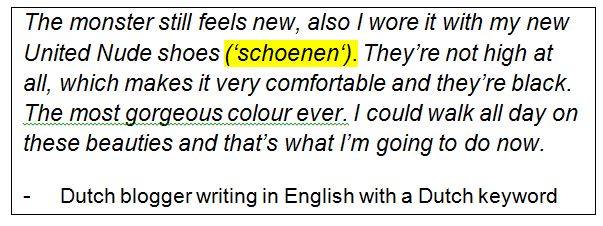A Dutch case study
Many people who visit the Netherlands are surprised at our level of English. We Dutch people pride ourselves on our English language skills.
The secret to our success in establishing English as a second language is a combination of early linguistic education (we start at the age of 10) and many hours spent watching American soaps and comedies! Unlike almost all of our European neighbours, we do not dub our foreign programming, which means we are much more exposed to different languages.
A lot of Dutch bloggers have to make an important decision at the start of their blog; “Do I blog in English or Dutch?” A valid question, since there are so many people in the world who speak English and only a small fraction who speak Dutch.
When I started working for Search Laboratory I was stunned at the number of Dutch bloggers who wrote only in English. There are also dual language blogs where bloggers write duplicate posts (Dutch & English) on the same page, as well as blogs which have an English subfolder.
What is the best choice?
So what is the best choice to make here? Dual language blogs are definitely not the way to go! Google has a hard time ranking your website because it gets confused by the two different languages. It also finds it difficult to understand who the website targets and thus feels it cannot provide a good customer service to its users. So if you’re writing in two (or more!) languages, your website won’t rank as well as it would have, had it been written in one consistent language.
The other two options of having your blog completely in English or having a separate subfolder with a different language are much better, but bear the following in mind when making your choice:
Be very honest about your English writing skills
If you get it wrong and your level is not good enough, the English speaking people will not read your content and you will alienate the Dutch speaking audience who fail to see the benefit of your chosen language.
I have come across many Dutch bloggers who write in English with Dutch spelling and grammar rules. Nothing annoys me (or Google for that matter) more than reading a badly written piece of content. We will click away from the page and what’s more Googles algorithm will slap you for it.

Think of your target audience
If you are going to be talking predominantly about local events, products, etc. then there is no point writing in English. For example the blogger below was clearly approached by a company to target their Dutch keyword (highlighted in yellow). This Dutch word (which carries the link) comes out of nowhere, is completely unrelated to the English content surrounding it, and just looks very spammy.

Googles localisation awareness
Another point to bear in mind if you are dead set on blogging in English is the domain you choose; Google localises their search results, so if you are blogging from an ‘nl’ country extension, you might be blogging in English, but you will mostly be displayed for search entries made by people in the Netherlands.
Obviously the more authority your site generates and the more links it receives from abroad, the more Google will override your country extension. But it would be best to opt for a .com or .org extension if you know you are going to blog in English.
The no.1 reason to write in your native tongue is simple: it is easier. However well you think you know the English language, it will never be your mother tongue.
My ten cent’s worth
My advice is, if you are not bilingual and you don’t have a native, English speaking, proof-reading partner; ask yourself “Am I really capable of getting my message across in English?”
If you are, then go for it! When in doubt choose your own language. It might be best to really become a thought-leader in your own country before taking over the rest of the world. That way, when you are ready, you can feed the authority of your brilliant native language blog into your English speaking one.


